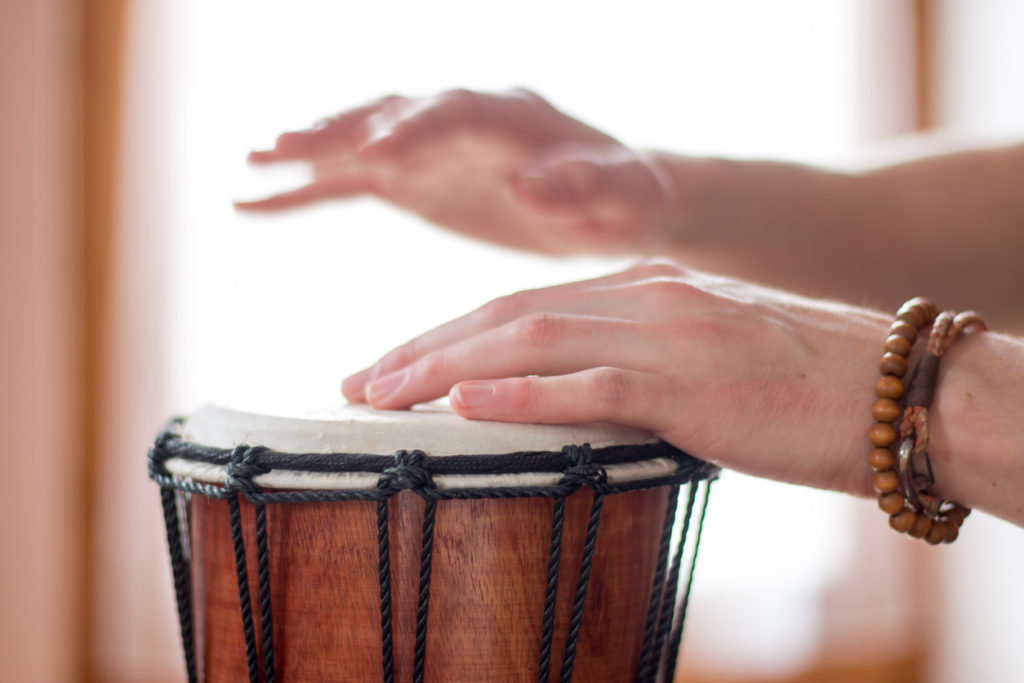Music therapy, a research-based practice in which music supports people striving to improve their health, functioning and well-being,1 has roots in ancient times2 and is becoming commonplace in contemporary medicine.3 Music is used in a variety of clinical settings to reduce stress and distract patients from unpleasant symptoms.3 Its uses range from intensive care units to chronic pain to palliative care.3 Recent research shows that music therapy can be applied to the perioperative period for children as well as adults. Anesthesia providers should consider the role and potential benefits of music therapy in procedures involving anesthesia.
Clinicians can employ music therapy before, during and after a procedure for a wide range of purposes. For example, Bringman et al. played relaxing music to patients before elective procedures to reduce preoperative anxiety.4 Other studies include intraoperative music therapy for patients under regional anesthesia5 and music for postoperative pain management.6,7 Some studies involve music therapy throughout the entire perioperative period. Ortega et al. provided music therapy to patients before, during and after regional anesthesia for nasal bone fractures,8 and Lin et al.’s study involved music from the evening before surgery to the second day after surgery.9 A study by Kahloul et al. even included perioperative music therapy for patients undergoing general anesthesia, who were unconscious for part of the time music was playing.10 Evidently, researchers have experimented with playing music throughout many steps of procedures across various anesthetic modalities.
Before integrating music therapy into their practices, anesthesia providers should be knowledgeable about the efficacy of such strategies. Kahloul et al.’s study found that patients who listened to music right before anesthesia induction through waking had more stable systolic arterial blood pressure, higher likelihood of a calm recovery, higher satisfaction rate and lower pain scores.10 Lin et al. found that music therapy had some positive effects on levels of preoperative anxiety and postoperative pain in patients undergoing spinal surgery.9 According to Bringman et al.’s study, preoperative relaxing music was more effective than orally administered midazolam in reducing patients’ anxiety before elective surgery.4 Lee and Kim’s patients undergoing prostatectomy with spinal anesthesia showed lower anxiety and surgery-related fatigue with an intraoperative music therapy intervention.11 Meanwhile, Lee et al. found that music in the recovery room helped reduce patients’ anxiety levels12 and Tse et al. showed that listening to music during the first 24 hours after surgery led to reduced pain.6 Varbanova’s study on postoperative music therapy for male patients who had undergone abdominal surgery found that it was effective in reducing pain perception but not opioid consumption.7 Despite a plethora of evidence that perioperative music therapy can lead to decreased pain, decreased opioid needs and increased patient satisfaction,13 not all studies agree on its efficacy. Kühlmann et al. found that music interventions in infants from zero to three years of age receiving general anesthesia were not beneficial to many participants.14 A study by Kavakli et al. found that music use actually increased intraoperative patient anxiety for carotid endarterectomy procedures. Overall, music seems to be useful for anxiety and pain reduction, but it may not help in all populations or surgery types.
Given the widespread use of music therapy for stress reduction, anesthesia providers may want to consider integrating music into their practices. Music can be used before, during or after a procedure, and in combination with regional or general anesthesia. Though many studies show the efficacy of music therapy in reducing perioperative pain and anxiety, music may not be useful for all patients or under all conditions. Future research should investigate the effects of different types of music on patients’ pain levels and the most helpful time to listen to music.
1. Australian Music Therapy Association. What is Music Therapy? About 2012; https://www.austmta.org.au/content/what-music-therapy.
2. West M. Music Therapy in Antiquity. In: Horden P, ed. Music as Medicine: The History of Music Therapy Since Antiquity. Farnham, UK: Ashgate; 2000.
3. Kemper KJ, Danhauer SC. Music as therapy. Southern Medical Journal. 2005;98(3):282–288.
4. Bringman H, Giesecke K, Thörne A, Bringman S. Relaxing music as pre-medication before surgery: A randomised controlled trial. Acta Anaesthesiologica Scandinavica. 2009;53(6):759–764.
5. Kavakli AS, Kavrut Ozturk N, Yavuzel Adas H, et al. The effects of music on anxiety and pain in patients during carotid endarterectomy under regional anesthesia: A randomized controlled trial. Complementary Therapies in Medicine. June 2019;44:94–101.
6. Tse MMY, Chan MF, Benzie IFF. The Effect of Music Therapy on Postoperative Pain, Heart Rate, Systolic Blood Pressure and Analgesic Use Following Nasal Surgery. Journal of Pain & Palliative Care Pharmacotherapy. 2005;19(3):21–29.
7. Varbanova M, Neamtu A, Gaar E, Grigorov M. Music reduces postoperative pain perception in male patients after abdominal surgery under general anesthesia. International Journal of Anesthesiology and Research. 2016;4(6):272–277.
8. Ortega A, Gauna F, Munoz D, Oberreuter G, Breinbauer HA, Carrasco L. Music Therapy for Pain and Anxiety Management in Nasal Bone Fracture Reduction: Randomized Controlled Clinical Trial. Otolaryngology–Head and Neck Surgery. 2019;161(4):613–619.
9. Lin P-C, Lin M-L, Huang L-C, Hsu H-C, Lin C-C. Music therapy for patients receiving spine surgery. Journal of Clinical Nursing. 2011;20(7–8):960–968.
10. Kahloul M, Mhamdi S, Nakhli MS, et al. Effects of music therapy under general anesthesia in patients undergoing abdominal surgery. The Libyan Journal of Medicine. 2017;12(1):1260886.
11. Lee YE, Kim JS. Convergence Study on Effects of Music Therapy in Patients Undergoing Prostatectomy with Spinal Anesthesia. Journal of the Korea Convergence Society. 2017;8(1):97–106.
12. Lee WP, Wu PY, Lee MY, Ho LH, Shih WM. Music listening alleviates anxiety and physiological responses in patients receiving spinal anesthesia. Complementary Therapies in Medicine. April 2017;31:8–13.
13. Flanagan DA, Kerin A. How is Intraoperative Music Therapy Beneficial to Adult Patients Undergoing General Anesthesia? A Systematic Review. Anesthesia eJournal. June 2017;5:5–13.
14. Kühlmann AYR, van Rosmalen J, Staals LM, et al. Music Interventions in Pediatric Surgery (The Music Under Surgery In Children Study): A Randomized Clinical Trial. Anesthesia & Analgesia. January 8, 2019.
